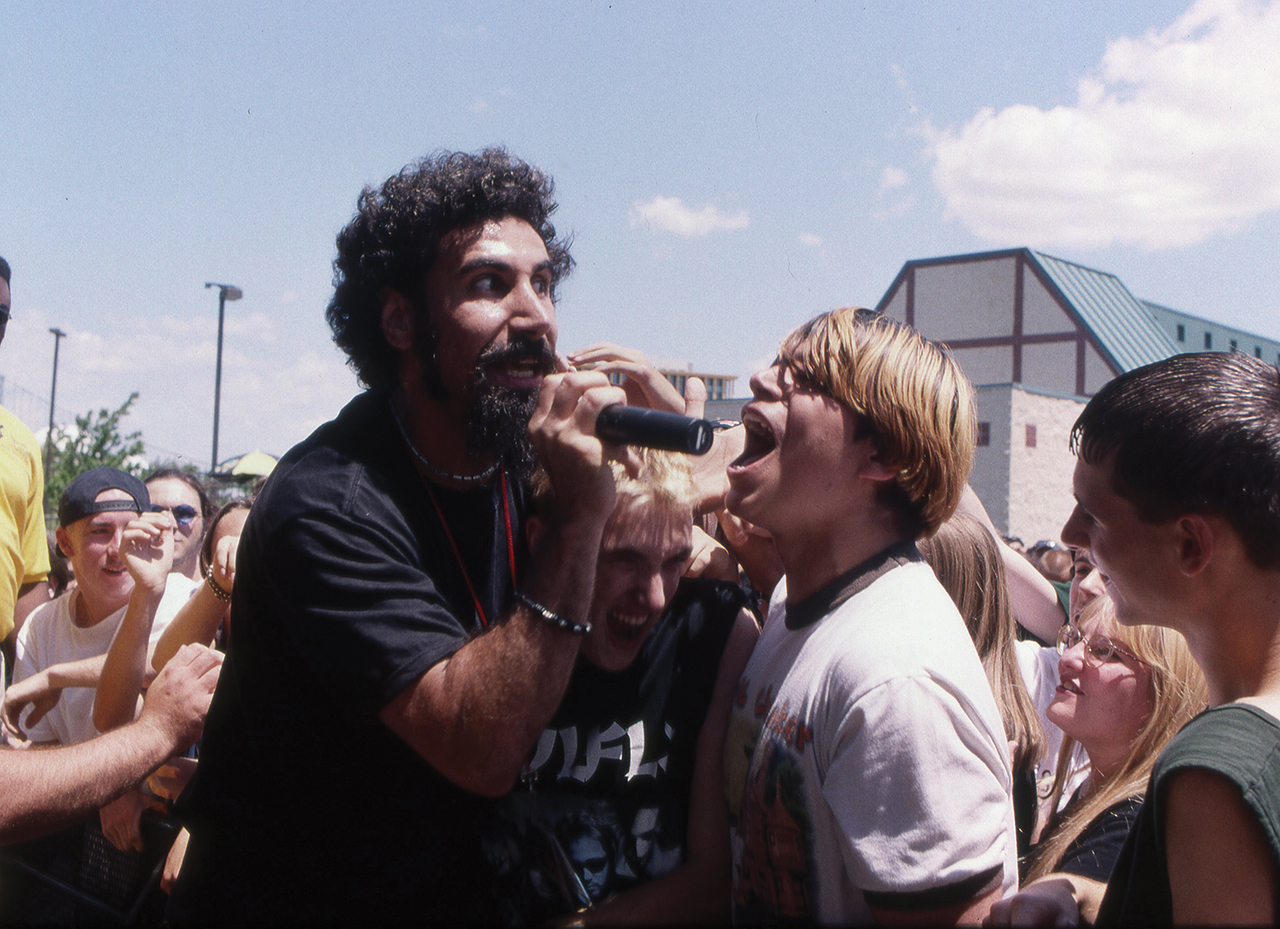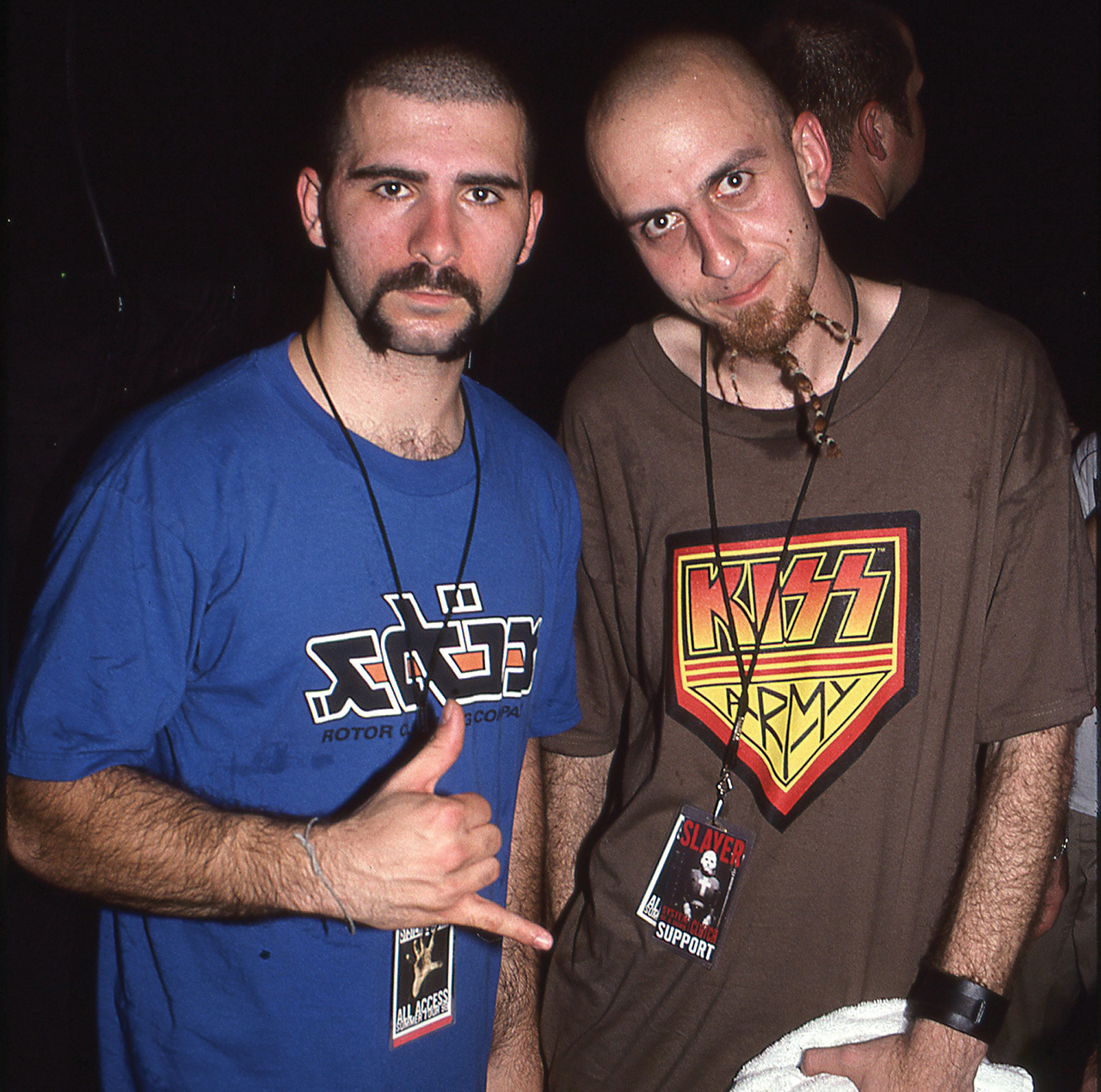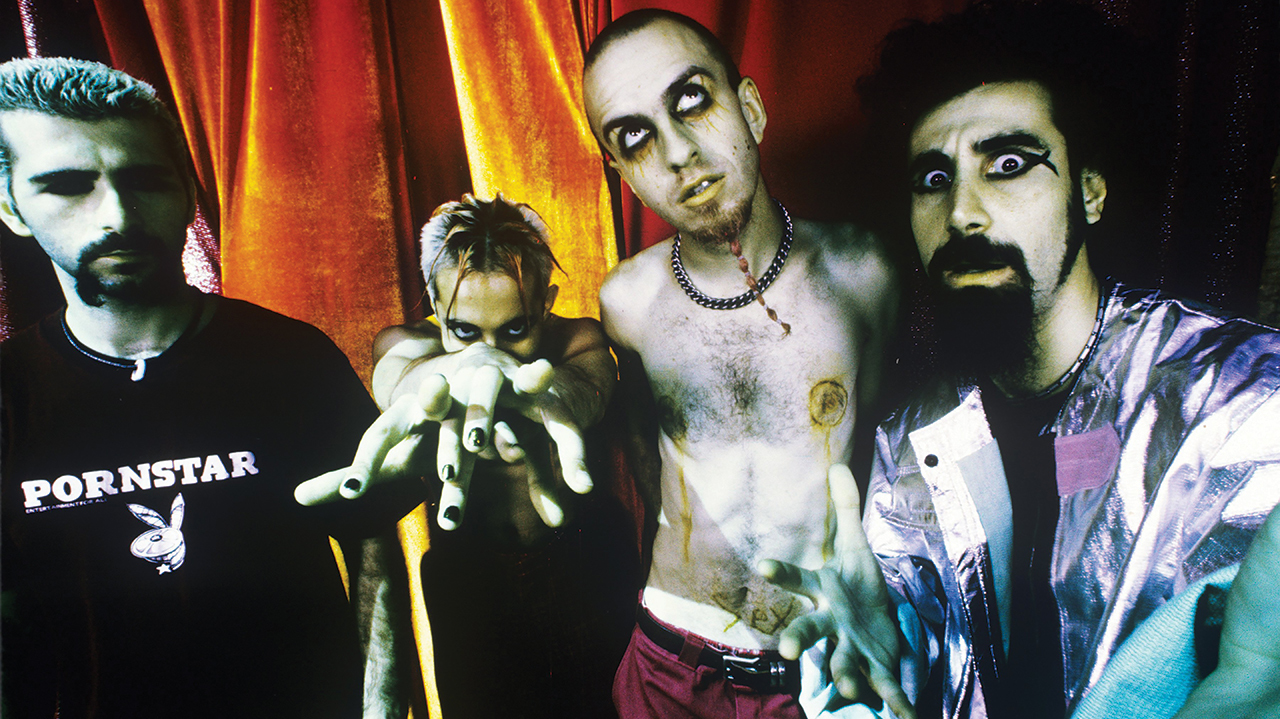When Metal Hammer posted a news story last month confirming that System Of A Down will release a new album in 2017, the internet went righteously berserk. And make no mistake about it: this is massive.
To put it into perspective, System’s Chop Suey! video has notched up nearly half a billion views on YouTube, despite having been released before YouTube even existed. That same track has also received more than twice as many streams on Spotify than any Slipknot song. Meanwhile, with no new album to promote, they’ve continued to sell out arenas and headline festivals whenever they’ve reconvened, and when they were revealed as Download headliners for next year, virtually no one raised an eyebrow. Despite not having released a shred of new music since 2005, System Of A Down are still a very big deal indeed, and yet they’re also one of the most eccentric, idiosyncratic and downright unlikely bands to ever reach that status. And, somewhat fittingly, it is that thread of uniqueness that has pinned their story together from day one.
“The fact that the band shares the same roots, the same Armenian heritage, is a common bond,” singer Serj Tankian suggests. “In a way we’re all outsiders and see things from the position of an outsider. We look at things from an outside perspective and that perspective is often more clear.”
Born in 1967, Serj Tankian spent the first eight years of his life in war-torn Beirut, Lebanon, a city that had long been home to many displaced Armenians, including the singer’s parents (whose own parents were victims of the Armenian genocide that took place between 1915 and 1917 at the hands of the Ottoman Empire in Turkey). “I was eight years old when I came to Los Angeles, so I don’t have a lot of memories of my time in Beirut,” Serj admits. “But I do have some visual memories. I remember the beginnings of the civil war. I’d learnt some English at school when I was young, but moving to LA was still somewhat of a culture shock after Lebanon, and one thing I can say is that if you’ve ever heard bombs fall in a city, you will have a different sensitivity to dropping bombs on a city.”
His family relocated to Los Angeles in 1975, as civil war reduced much of Beirut to rubble, and Serj found himself immersed in an alien but thrilling new world in sun-drenched California. A shy but incredibly smart child with a passion for learning, he swiftly blossomed as American life became his reality, excelling at school and developing a great interest in politics and activism along the way. Having experienced the reality of living amid military violence and social disintegration, Serj’s perspective on the world was always going to be considerably different from the young Americans he was now consorting with. Even the young singer’s taste in music set him apart from many of his peers: with no interest in rock, punk or metal, Serj instead developed an eclectic array of favourites, ranging from sitar guru Ravi Shankar to oddball goth-punks Alien Sex Fiend. As a result, when Serj’s musical abilities began to surface, he was not destined to ever toe the conformist line. All he needed was suitable partners in crime.
Seven years Serj’s junior, Shavarsh ‘Shavo’ Odadjian was born in Armenia’s capital city of Yerevan in 1974. At the age of five, his family managed to secure US citizenship and relocated to Hollywood, where he enrolled at the same Rose And Alex Pilibos School that Serj had been attending for several years. Daron Malakian – the only member of System to be born in the US, after his parents emigrated from Armenia – enrolled at the school the following year. It was almost as if fate was conspiring to ensure that their paths would cross, even though it would be much later that Serj and his future comrades would actually meet.
“My parents always tried to protect me from the evils that Hollywood holds and that is probably why I see it as a special place,” Shavo says of his adopted hometown. “Daron grew up in the same neighbourhood as me and his fondest and worst memories of all time are about Hollywood as well. Growing up there is not like growing up in any other place because you are exposed to so much shit. It definitely makes you grow up differently and think differently. There were helicopters outside every night and you’d hear gunshots.”

Hollywood would, however, enable him to have some occasional chance encounters with his heroes…
“Mötley Crüe did their videotaping for Girls, Girls, Girls right across from where we lived,” he remembers. “My mom and I were in the parking lot there, at the supermarket across from the club. My mom says, ‘That guy next to us looks like the guy on your wall.’ I looked, and it was Nikki Sixx. I was starstruck. I went home, grabbed my Too Fast For Love album and I went and asked him to sign it. They all signed it, and Nikki asked if I’d heard Girls, Girls, Girls, which was their new song. He told me to go inside, but I was too young, so he told the bouncer that I was family and to let me in!”
While such meetings had a profound impact on the young Shavo, it was Daron who first set his heart on a career in music. A self-confessed “bad student”, he was far too enthralled by Kiss, Def Leppard and Mötley Crüe to pay much attention to his education.
“Being a musician is all I’ve ever dreamed of being and playing the guitar or drums is all I’ve ever done,” he states. “I don’t have a plan B. I don’t do anything else. I can’t repair a car. I can’t fix a leaky faucet. But I can write you a song. I realised early on that I could do something not many people could do. No one taught me how to do it – I just did it.”
The foundations for what would become System of A Down were laid in 1992, when Daron and his bassist friend Dave Hakopyan (later of The Apex Theory) formed the band Soil (no, not that one!), recruiting Serj Tankian from local mob Forever Young and a drummer widely known as Dingo. Meanwhile, Serj had already been jamming with Shavo, after the former unwitting schoolmates were newly introduced. Exuberantly combining metal riffs and weird art rock indulgence, with their Armenian folk music heritage lurking somewhere in the background, their sound was a clear forerunner of System’s esoteric racket. Keen to get involved in this exciting new project, Shavo volunteered to manage Soil and secured them their first gig, at Café Club Fais Do-Do on West Adams Boulevard in LA. In true rock’n’roll fashion, this initial lineup disintegrated soon after, by which point Shavo was now confident enough as a musician that he slotted neatly into place alongside Daron, Serj and – after a long period of drum-less frustration – new drummer Andy Khachaturian, with both Serj and Daron assuming vocal duties. To mark the solidifying of this new lineup, they ditched their old name and became first Victims Of A Down and then, after some discussion, System Of A Down.
“‘System’ was chosen as a better, stronger word, and it makes it into a ‘whole’,” Serj explains. “Instead of people in particular, it’s the society.” “And our album will be under the ‘S’ section,” Daron adds. “Next to Slayer!”
- Download 2017 Line-up: System Of A Down, Aerosmith, Biffy Clyro to headline
- Hummers, Dope And Double Albums: Inside System Of A Down
- 6 things we want from the new System Of A Down album
- System Of A Down's Dolmayan wants to adopt Syrian child
System performed their first official gig at The Roxy in LA on May 28, 1995. Despite appearing on a bill of ska bands and not even having released a demo tape, they managed to bring 175 friends to the venue with them, plus plenty more that had been enticed to the show by the posters that Daron and Shavo had plastered all over Hollywood and beyond. The Roxy was absolutely rammed, and what the assembled throng witnessed was very obviously the beginning of something huge. System simply didn’t look or sound like anything else that was going on in heavy music at that time. At that first gig, Serj sported a bizarre, corkscrew afro and his trademark beard, drummer Andy was painted head-to-toe in white, Shavo was bare-chested and faintly terrifying and Daron… well, he was wearing an Adidas tracksuit, but then this was 1995 and Korn were very much the band of the day. That said, the parallels between System’s music and the then-burgeoning nu metal movement are largely illusory. Quirky, unpredictable, both startlingly extreme and blissfully melodic, their sound was an exhilarating exercise in instinctive cross-pollination that, while not apparently exhibiting much mainstream potential, certainly felt like a breath of fresh air. A large part of that was the rather unusual approach to writing that Daron has made a hallmark of his style.
“I’m really not that focused on the guitar exclusively,” he explains. “I play five different instruments, so I’m inspired by music as a whole. A guitar is a great tool to write songs, but I don’t care whether those songs are written on a guitar, behind a keyboard or a drumkit. So long as songs come out is all that matters, rather than, you know, great guitar solos of the past or whatever.”
“I’ve been influenced a lot less by music than by life itself,” offers Serj. “However, there are a lot of singers who have influenced me over time, and my dad was an influence. My dad is an amazing singer and every time he sings it provokes a lot of emotion. It makes me want to cry. He sings mostly old Armenian folk songs. Maybe that’s where my singing comes from…”
As their reputation continued to grow, System hooked up with a management team who would oversee their subsequent rise to glory. A first demo tape was recorded, including future classics Sugar, Suite-Pee and P.L.U.C.K., and the buzz surrounding the band rapidly grew to a deafening crescendo. By 1997, as the internet started to become ubiquitous, their notoriety began to extend beyond LA and across the globe. Two more demos cemented their status as the hottest new band in the US, with glowing reviews flooding in and mounting interest from countless labels. One final piece of the puzzle was required, however. Drummer Andy Khachaturian departed in 1997 and was replaced by John Dolmayan, who had also been born in Beirut and experienced the horrors of Lebanon’s civil war first hand. The System we know and love today was now firmly in place and all that remained was for some lucky label to make the right offer. That proposal eventually came from legendary producer Rick Rubin, who saw System at one of their sold-out hometown shows in 1997.
“I saw him from the stage and he seemed pretty much into it,” said Shavo. “Later, he told us that he was blown away, which blew us away, being 80s kids who loved all the rap stuff he came out with.”
“I remember laughing a lot because they seemed so crazy to me,” remembers Rick. “What I thought was unusual about them was that, first of all, they’re very heavy sounding, but original. System Of A Down didn’t sound like any bands I’d heard before… yet they were heavy.”

As 1997 drew to a close, System signed to Rick’s American imprint and entered Sound City Studios in LA to begin recording their debut album. With no shortage of material, not least thanks to Daron Malakian’s prolificacy, the band made light work of the sessions and by February 1998 the album was complete. Adorned with ‘The Hand With Five Fingers’, a striking image of a sepia-coloured hand reaching out from the darkness created by prominent anti-fascist artist John Heartfelt during Hitler’s rise in 1930s Germany, it was a debut album that knowingly and aggressively demanded our attention. Released on June 30, 1998, System Of A Down was not an instant success, only reaching #124 in the US charts upon its initial release, but a lot of people recognised that this band were something special, and the album soon became the most talked-about record of ’98. It also led to System joining that year’s Ozzfest tour and being offered a support slot with Slayer, first in the US and then in Europe, where Sepultura were also on the bill. Unlike many bands that have suffered at the hands of Slayer’s vociferous fanbase, System rather enjoyed the experience and reached a huge new audience as a result.
“I got a few cassettes and beer thrown at me,” laughed Daron. “But a lot of kids came up to us at the end of the shows and said they liked our sound because it was heavy, but original.”
During the European tour with Slayer, System pulled out of a show in Turkey, unwilling to indirectly endorse that country’s government and their ongoing denial that the Armenian genocide took place. Once again, the band’s integrity and unique character was more than obvious.
“We can’t play the show without giving vent to our views, because that’s part of our music,” Serj said at the time. “If we get up onstage and talk about the Armenian genocide, we’ve been told we’ll get arrested. We’re against the Turkish government, not their people. To this day their government has denied that the genocide ever took place. Playing there and not addressing the subject would have been too hypocritical.”
And therein lies the truth about System Of A Down: here is a band that were on the cusp of commercial triumph, and yet they never wavered from their principles or compromised on anything that they felt was truly important, making music that defied description while singing about things that genuinely matter. Less the result of a calculated formula than an intuitive urge to shake things up, their music would reach a peak of efficacy three years later with the release of Toxicity, the album that would turn these resolute oddballs into superstars, eventually attaining triple-platinum status in the US. Perhaps uniquely, System have managed to sustain their appeal and their allure, even during long periods of inactivity. Ultimately, there really is something special about this band. And that’s why everyone is insanely excited about the prospect of a new album in 2017. We’re counting the seconds. Bring it on.
A NEW SYSTEM OF A DOWN ALBUM WILL LAND NEXT YEAR. THESE QUOTES WERE TAKEN FROM BEN MYERS’ BOOK RIGHT HERE IN HOLLYWOOD: THE STORY OF SYSTEM OF A DOWN, OUT NOW
What do old people think of System Of A Down?
System Of A Down Are As Mad As Hell And Are Not Going To Take It Anymore
